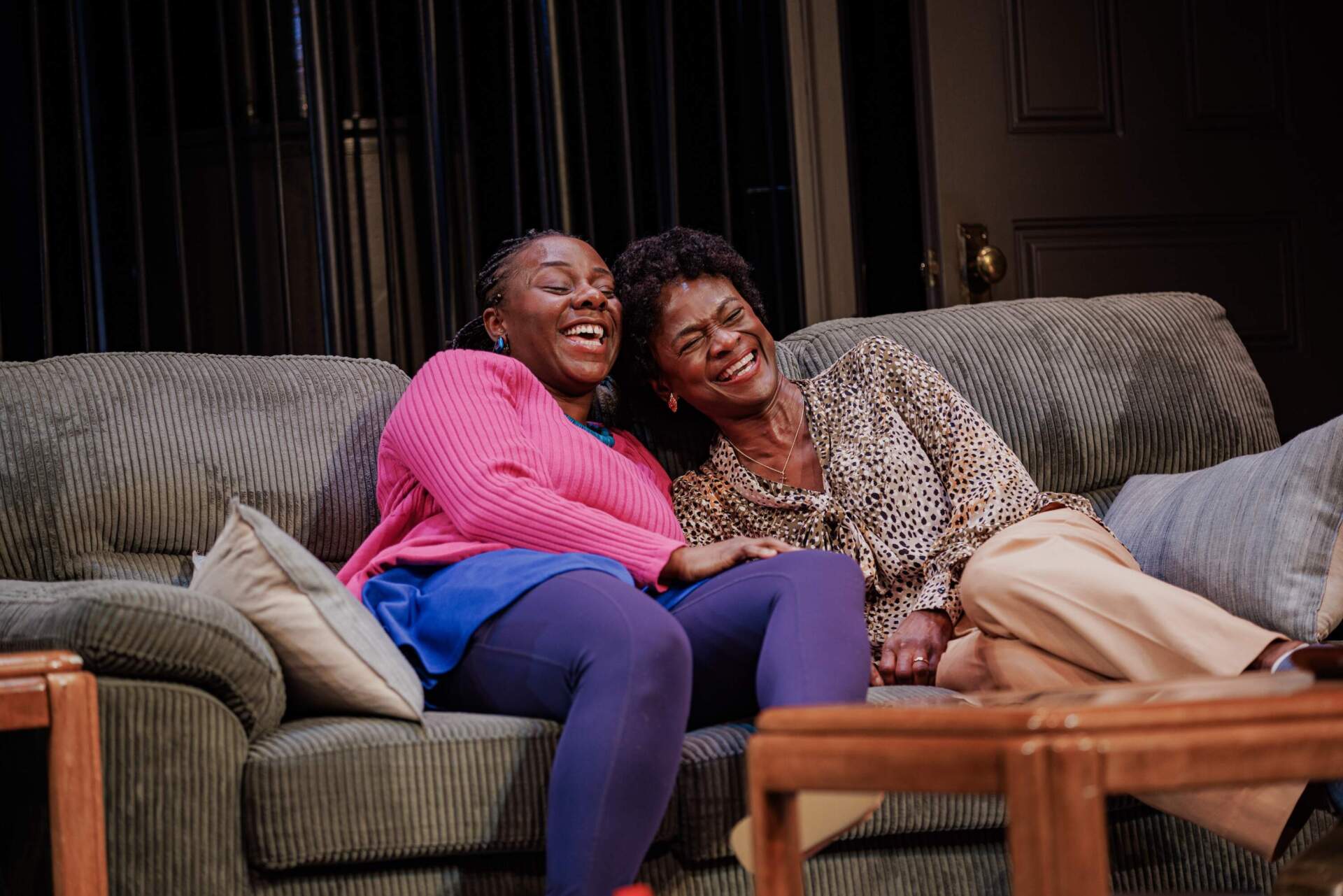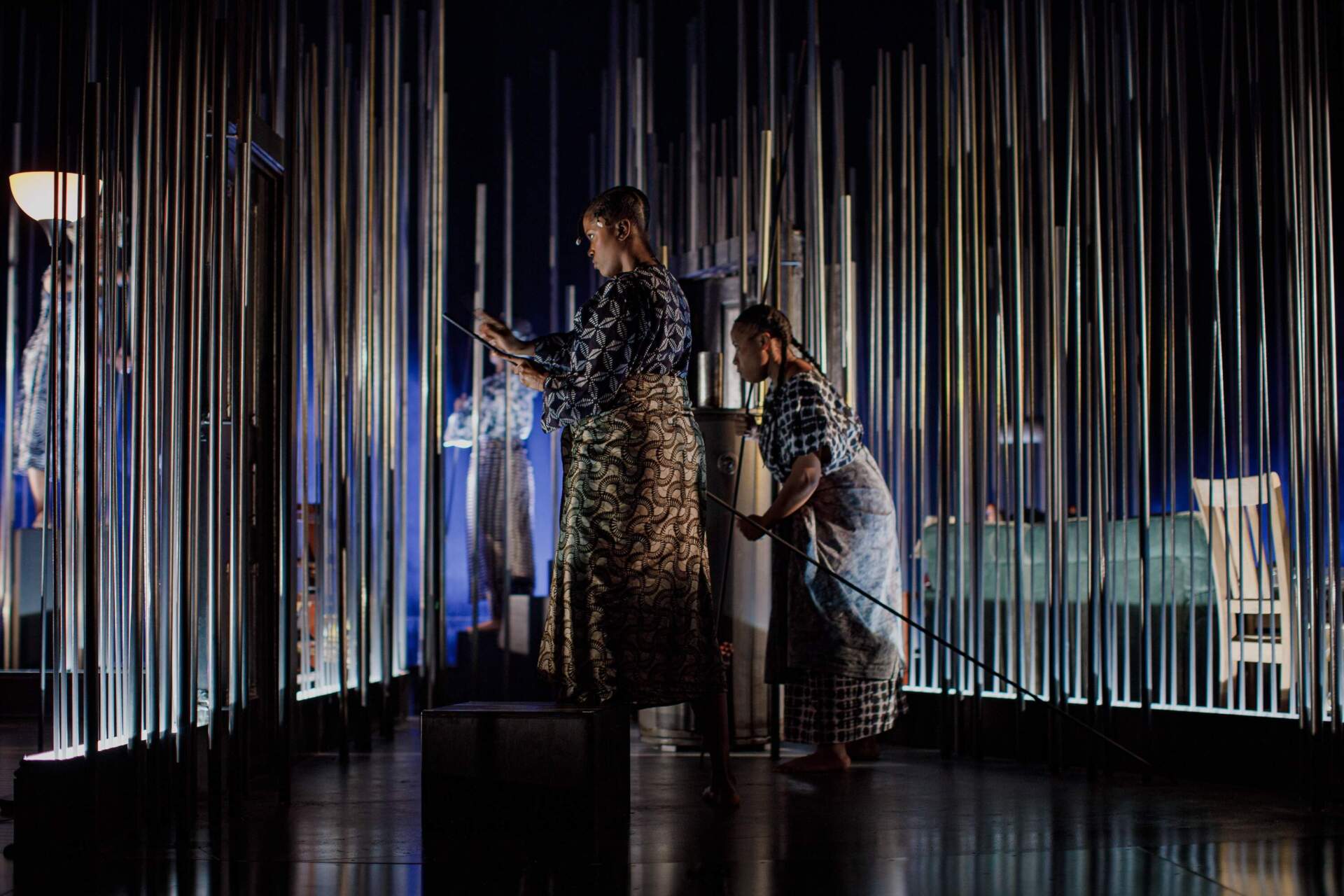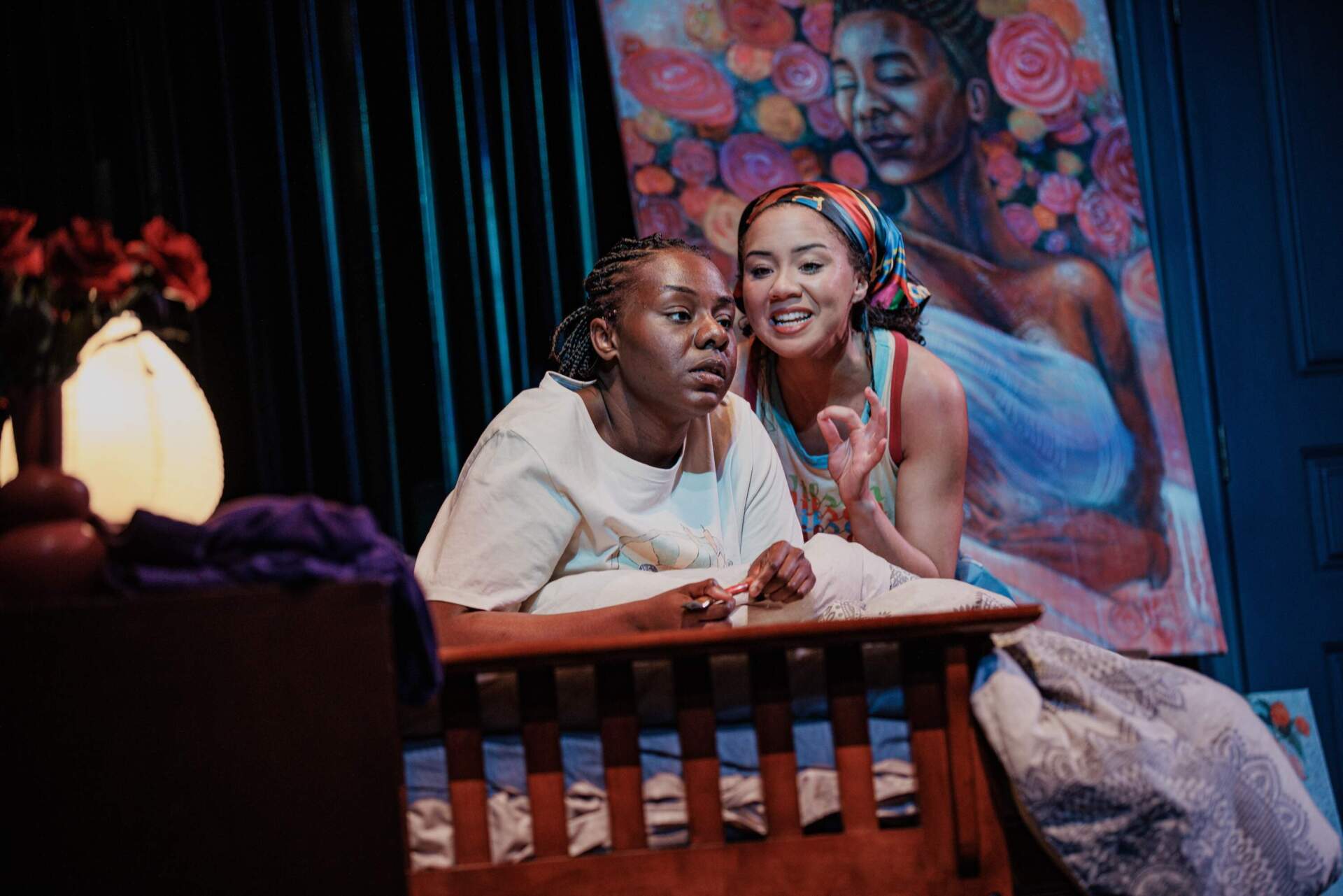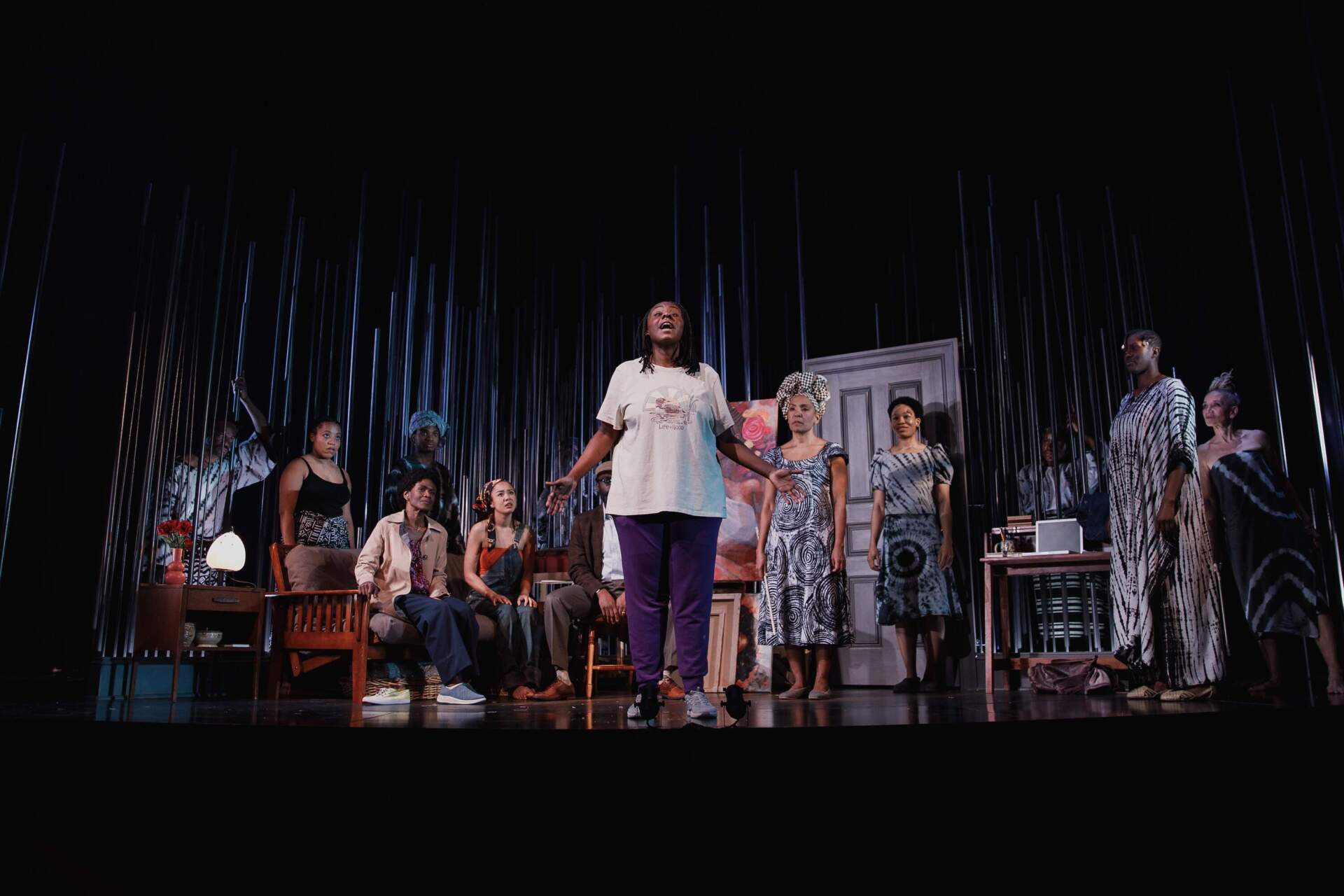Advertisement
Review
'The Grove' unfurls the Ufot family's moving progression

In Worcester, Massachusetts, the Ufot family is readying for a party. Furniture is being dusted, cobwebs swept away, and praise and worship while cleaning has (somewhat begrudgingly) commenced. The festivities are to honor the eldest daughter, Adiaha Ufot’s accomplishment of graduating from New York University with a master’s in creative writing.
It should be a joyous occasion, but something isn’t quite right. An undercurrent of tension — between colliding worlds, identities, and desires — is coursing through Adiaha’s life. A secret looms over her, and she’s buckling beneath its weight. Mfoniso Udofia, the playwright of this moving tale, of which Adiaha is at the center, masterfully teases it out.
“The Grove” is the superb second play in Udofia’s Ufot Family Cycle at the Huntington Theatre through March 9. All the stories in Udofia’s nine-play cycle — each is written to also stand alone — will be produced over two years in Boston and beyond.

In the first production “Sojourners,” audiences meet Ufot matriarch Abasiama, who comes to the United States from Nigeria. She meets Disciple, also from Nigeria, whom she later marries. In “The Grove” 30 years have passed, and Abasiama and Disciple have three kids, Adiaha, Toyoima, and Ekong.
But starting a new life and raising a family in a foreign country brings about all kinds of unanticipated complexities. There’s a longing for home, the familiar sounds, smells, and people. There’s also a need to excel in getting an education, solidifying a career, cultivating a fruitful partnership, and raising kids who respect their heritage. But what happens when the need or desire to assimilate encroaches on your ancestral roots? Or what if one’s desires directly conflict with familial and cultural expectations?
These are just a few of the tensions in Udofia’s prodigious narrative that the show’s director, Awoye Timpo (“The Bluest Eye”), allows to artfully unfold. Timpo’s vision and Udofia’s poetic, layered writing combine for a radiant production that pricks the heart.

Onstage, pliable, vertical rods form rooms and walls that feel simultaneously permanent and impermanent. These wire-framed areas from set designer Jason Ardizzone-West (who also created the gorgeous set for “K-I-S-S-I-N-G”) rotate as the characters — a stellar cast that astonishes as they portray current Ufot family members and ancestors — walk through them. Matriarchal ancestors or shadows are nearly ever-present, tucked behind these walls and tethered to their kin. They call out to Adiaha (an exceptional Abigail C. Onwunali), though she doesn’t realize it at first. Speaking in Ibibio, the Ufot’s native tongue, the ancestors — clad in African fabric chosen by costume designer Serita Fellows — some with cowrie shells at the end of cornrows and others with headwraps, want to assure her that the secret she carries is not hers alone to bear. Adiaha is deeply in love with a long-time friend, Kim, rendered beautifully by Valyn Lyric Turner. But Adiaha’s unspoken desires threaten to tear her and her family apart.
Advertisement

As the oldest, there’s a mantle Adiaha must carry. She is the first child whose life symbolizes so much for the Ufots, and the burden of expectation to be the best and do everything right is palpable. Adiaha rushes around to help her father Disciple get ready for the party and wrangles her brother Ekong (Amani Kojo), whose discontent is unbridled, and her sister Toyoima (Aisha Kuro Akorede), who is not prepared to fill the space her sister left. She finds time to bond with her mom, Abasiama (Patrice Johnson Chevannes), which starts sweetly but turns sour when Adiaha’s personal life comes up. In this play, Chevannes’ Abasiama doesn’t get as much time to shine, but she shows her grit and her longing for something she doesn’t have the space to speak about yet.
The remarkable cast brims with skill, from uncle Udosen (Paul-Robert Pryce) with his modern ideas who lives in Atlanta; to Godwin (Maduka Steady), a more traditional man in cobalt blue and orange African clothing; to the fiery, astounding Joshua Olumide as Disciple, Adiaha’s father. Disciple loves Jesus, Nigeria, education, and his family. He believes so much in pursuing achievement and holds his children and wife to impossible standards. Olumide can always be counted on for an outstanding performance—like in his role as Joseph Asagai in “A Raisin in the Sun,” which he starred in with Turner. Still, his star brightens even more in this second installment as the Ufot patriarch. His booming musical cadence when he gives directives, and the boiling anger he expresses in rapid Ibibio, made this audience member sit up at attention.

There are some impossibly gorgeous moments in “The Grove,” the name seemingly a nod to the close kinship of trees that communicate through a network of underground roots unseen, nourishing and sustaining each other. Adiaha’s ancestors are that grove, surrounding, loving, and protecting her. So is her partner Kim, with whom she gets to be herself. In their apartment, the frustration of daily life seems to form a temporary wedge between them. But the two make up in a tender moment of singing where Kim’s soprano and Adiaha’s alto harmonize splendidly. Also, the choice to feature Ibibio without translation articulates a reverence for it. And the choice to use it, even as the Ufot children don’t seem to speak it fluently, adds to that tension of losing touch with the past.
There’s much more simmering in this tale — with hints of what’s to come or what’s transpired in the past — where Adiaha uncovers more about her ancestors during this challenging time. She must make a choice: will she stand firm in her identity and in her love, or will she put her desires aside to conform to her parent’s plans for her? Whatever she does, the repercussions could be severe. But the answers to this question and others in this well-written saga are worth heading to the theater to watch and wait for.
The Huntington Theatre’s production of “The Grove” runs now through March 9 at the Calderwood Pavilion.
